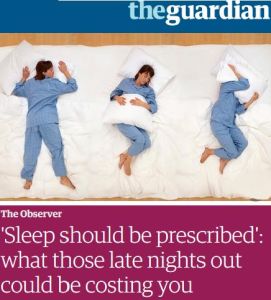
Rachel Cooke
Sleep Should Be Prescribed
What Those Late Nights Out Could Be Costing You
The Guardian, 2017
What's inside?
Sleep may be the simplest, most important form of preventive medicine there is. So why don’t people get enough?
Recommendation
Do you burn the candle at both ends? Modern life tends to demand nothing less, but as journalist and writer Rachel Cooke reveals, lack of sleep takes a terrible toll on human health and well-being. Sleep isn’t only a chance for the body to rest; the brain also prepares itself for the next day. If people shortchange themselves on sleep, they quickly become unhappy, unwell and unproductive. For no cost at all, a good night’s sleep protects you from a vast array of nasty diseases and leaves you mentally and physically refreshed. getAbstract recommends this article to anyone who would like to get more sleep.
Take-Aways
- Sufficient sleep – at least seven hours per night – is essential for health and well-being.
- Lack of sleep disrupts hormone production, making it easier to gain weight and harder to control blood sugar, and it raises blood pressure.
- Naps have their place, but they can’t replace deep sleep.
- The constant presence of electric light has an adverse effect on sleep, and so has modern employment.
- Approach sleep as a discipline, creating a routine of retiring for the night and waking at the same time each day. Avoid coffee, alcohol and sleeping pills.
Summary
Matthew Walker is the champion of getting a good night’s sleep. As director of the Center for Human Sleep Science at the University of California, Berkeley, his focus is on how sleep affects well-being throughout people’s lives. His book Why We Sleep explores the dangers of sleep deprivation, which start taking effect when people get less than seven hours a night. Cancer, obesity, mental health issues, Alzheimer’s disease, diabetes and car accidents all become more likely with sleep loss. Lack of sleep disrupts hormone production, making it easier to gain weight and harder to control blood sugar. Sleep deprivation raises blood pressure – increasing the risk of heart attack and stroke.
“We are in the midst of a ‘catastrophic sleep-loss epidemic,’ the consequences of which are far graver than any of us could imagine. This situation…is only likely to change if government gets involved.”
Sleep comprises 90-minute cycles of two varieties, with deep sleep occurring near the end of each set. The first part of the cycle is NREM (nonrapid eye movement) sleep. During this phase, your body is deeply relaxed while your brain processes memories – pulsing with synchronized activity across the brain, followed by a period of inactivity and then pulsing again. In the later REM sleep part of the cycle, the brain is busier, functioning as it does when awake. After four to five cycles, the brain is rejuvenated. Naps have their place, but they can’t replace deep sleep.
“In 1942, less than 8% of the population was trying to survive on six hours or less sleep a night; in 2017, almost one in two people is.”
The constant presence of electric light has an adverse effect on sleep, and so has modern employment. After commuting and working all day, people want to spend time with family and unwind, often at the expense of sleep. It’s now common to feel guilty and ashamed about a healthy, natural need for eight or nine hours a night. People have begun to feel increasingly anxious, depressed and isolated.
“No one would look at an infant baby asleep, and say ‘What a lazy baby!’ We know sleeping is nonnegotiable for a baby. But that notion is quickly abandoned [as we grow up].”
Walker recommends approaching sleep as a discipline, creating a routine of retiring for the night and waking at the same time each day. Avoid coffee, alcohol and sleeping pills, as well as staying up all night – whether for work or play. The right amount of sleep should make it possible to wake without an alarm and remain alert without coffee. Walker believes it’s not only up to the individual, but that doctors should prescribe sleep and employers should incentivize it. Well-rested employees reward their employers with improved productivity, innovation and conduct.
About the Author
Rachel Cooke is a journalist and writer. She has written for the New Statesman, The Observer and The Guardian.
This document is restricted to personal use only.
My Highlights
Did you like this summary?
Read the articleThis summary has been shared with you by getAbstract.
We find, rate and summarize relevant knowledge to help people make better decisions in business and in their private lives.
Already a customer? Log in here.
















Comment on this summary